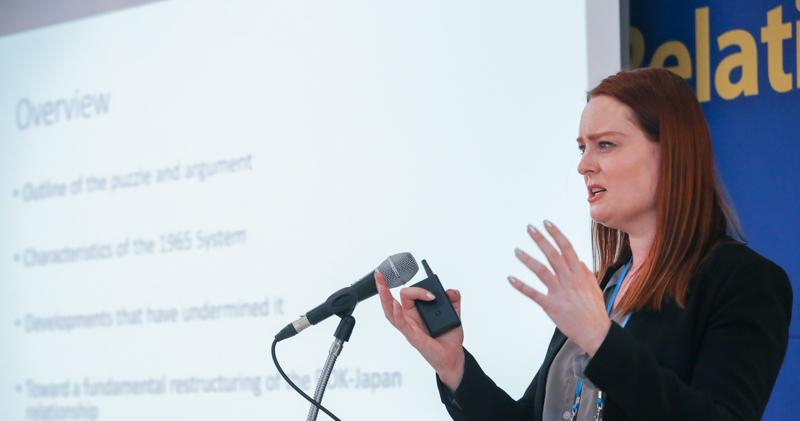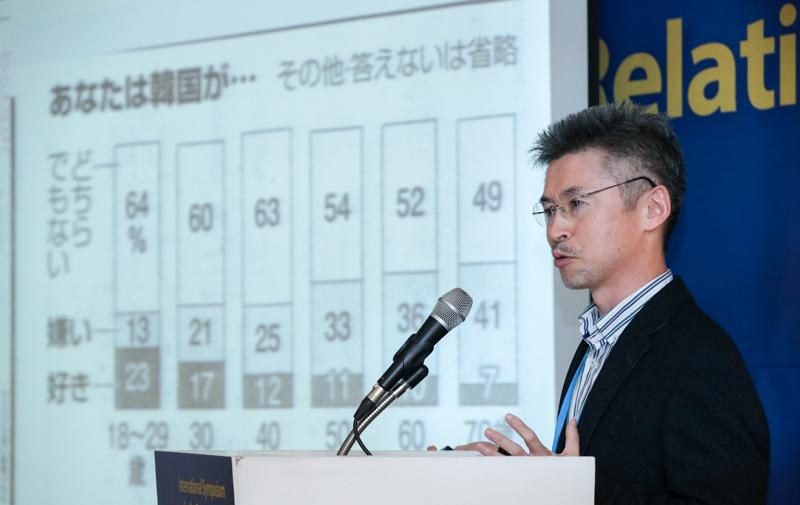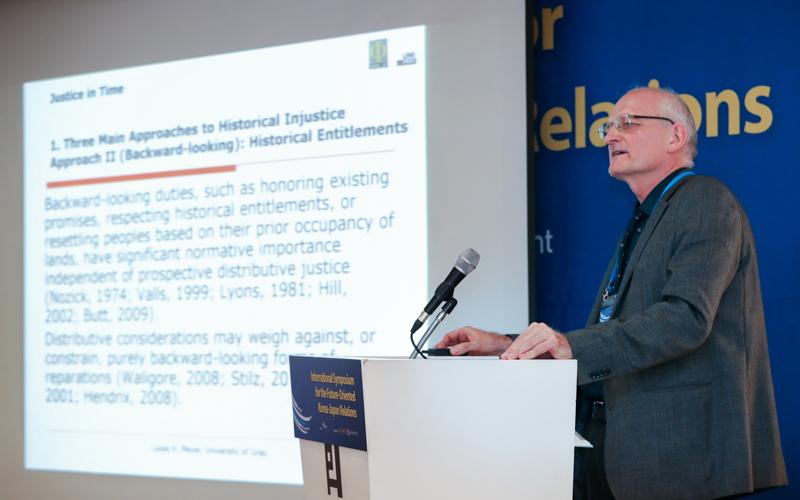
Lauren Richardson, a professor at Australian National University, on Dec. 10 speaks at the International Symposium for Future-oriented Korea-Japan Relations held at Hotel President in Seoul.
By Yoon Sojung
Photos = Kim Sunjoo
Seoul | Dec. 10, 2019
Scholars from both Korea and overseas on Dec. 10 stressed in a united voice the need to pursue a long-term approach to resolve conflicts between Korea and Japan.
At the International Symposium for Future-oriented Korea-Japan Relations held at Hotel President in Seoul, they proposed that the approach be made from the perspective of the victims of Japanese colonial rule.
Lauren Richardson, a professor at the Asia-Pacific College of Diplomacy of Australian National University, said, "Based on my interviews with the victims, it is unlikely that this issue will ever resolved in a one-time manner. It needs to be managed in the long run."
"We need to reestablish new fundamental principles of bilateral relations."
She added, "The Moon Jae-in administration's bottom-up process centering on the victims can be helpful to establish such new principles."

Ota Osamu, a professor at Doshisha University in Kyoto, Japan, on Dec. 10 announces the results of a survey conducted by the Japanese daily Asahi Shimbun in September this year on whether Japanese like Korea during the International Symposium for Future-oriented Korea-Japan Relations held at Hotel President in Seoul.
Ota Osamu, a professor at the Graduate School of Global Studies of Doshisha University in Kyoto, Japan, criticized his government's failure to rectify the country's past colonial rule of Korea and its wrongdoings.
"The 1965 Korea-Japan Claims Settlement Agreement did not contain Japan's effort to rectify its history of colonial rule, which requires a fact-finding process for the victims of forced labor mobilization, hunting down and punishing those responsible, and paying reparations and compensation to those who suffered," he said.
"If Japanese firms companies prioritize the human rights and dignity of the victims and continue their efforts to rectify the past, this will show the world that Japanese society does value human rights."
Former Korean Ambassador to Japan Lee Su-Hoon now a professor of international relations at Kyungnam University in Korea, recalled the New Korea-Japan Partnership Towards the 21st Century jointly declared in 1998 by then-President Kim Dae-jung and Japanese Prime Minister Keizo Obuchi as an example of the ideal bilateral relationship.
"Both leaders taught us the importance of humility and forgiveness," he said, adding, "I hope we can find a breakthrough under the so-called two-track approach of separating history-related issues and cooperation in economy and culture."
The attending scholars also underscored the significance of history education for improving bilateral ties.
Akiko Takenaka, a professor at the College of Arts and Sciences of the University of Kentucky, said, "With the rise of right wingers in late 1990s amid moves toward beautifying (Japanese) history, so-called victimhood began to spread throughout Japanese society in which people believed that they were the victims of (World War II), though Japan was the country that started the war."
"The lack of education has caused such a false belief to further spread."

Lukas Meyer, a professor of philosophy at the University of Graz in Austria, on Dec. 10 said paying reparations for historical injustice must be made regardless of time and period at the International Symposium for Future-oriented Korea-Japan Relations held at Hotel President in Seoul.
Lukas Meyer, a professor of philosophy at the University of Graz in Austria, said, "When we look at historical injustice, we must make both backward- and forward-looking approaches together." He added that backward-looking approaches include ways to honor and respect the victims and find facts, while those looking forward include paying reparations and compensation to the victims.
"Claiming damages and paying reparations still hold validity although they are made a long time later," Meyer said. "However, if the apology and reparations are made to surviving victims, this will have a very different meaning for them."
Mark Caprio, a professor at the College of Intercultural Communications of Rikkyo University in Tokyo, said, "For the development of and cooperation in Korea-Japan relations, I hope the two countries make moves to remember history, forgive and take actions toward contrition."
"Through history education and museum exhibitions, I hope the younger generation in both countries can remember the past and not repeat past wrongdoings."
arete@korea.kr